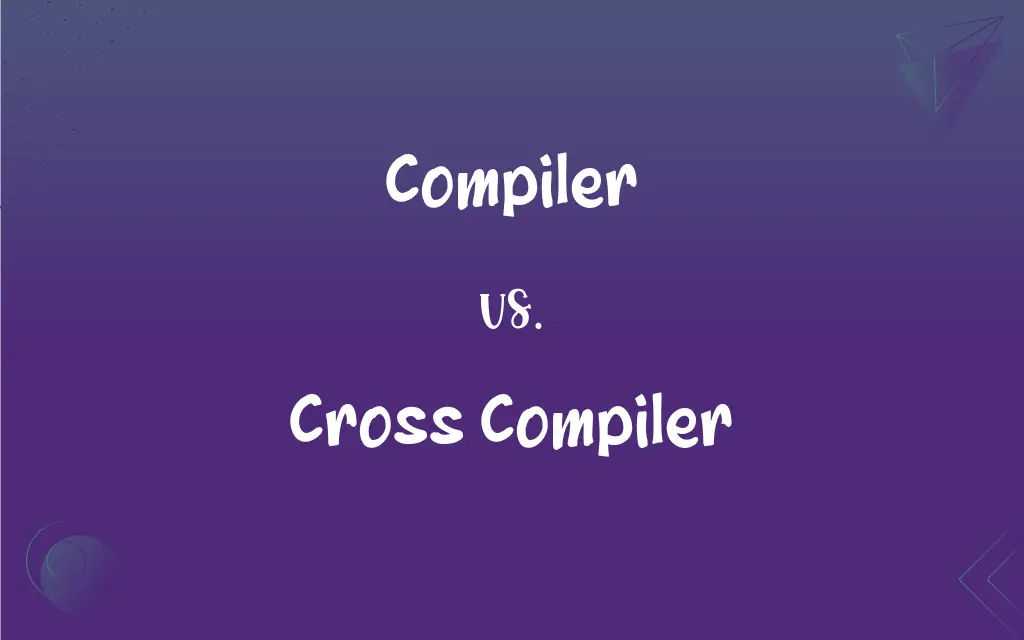Compiler vs. Cross Compiler: What's the Difference?
Edited by Aimie Carlson || By Janet White || Published on January 24, 2024
A compiler translates code from a high-level programming language to machine code for the same system, while a cross compiler does this for a different system.

Key Differences
A compiler is a software tool that converts code written in a high-level programming language, like C++ or Java, into machine code that a computer's processor can execute. A cross compiler, on the other hand, performs a similar function but is designed to produce machine code for a different type of system than the one it's running on.
The primary use of a compiler is to translate source code into executable code on the same platform, ensuring the program runs efficiently on the target machine. Cross compilers are essential for developing software for systems that are different from the developer's hardware, such as applications for embedded systems or different operating systems.
Compilers are integral to software development, enabling programs to run on specific architectures and operating systems. Cross compilers facilitate the creation of software for platforms that may not support direct compilation, like developing Windows applications on a Linux system.
Both compilers and cross compilers essentially perform the same task of code translation, the key difference lies in their target platforms. Cross compilers are particularly useful in scenarios where the target platform is less accessible or has limited resources, such as in the case of embedded systems or game consoles.
Comparison Chart
Target Platform
Converts code for the same system it runs on
Converts code for a different system
ADVERTISEMENT
Primary Use
To create executable code for the same platform
To develop software for other platforms or architectures
Development Environment
Used on the platform for which the code is being developed
Used to develop for platforms different from the host
Accessibility of Target Platform
Target platform is typically accessible or the same
Target platform may be less accessible or have fewer resources
Use Cases
General software development for native platforms
Embedded systems, cross-platform development, game consoles
Compiler and Cross Compiler Definitions
Compiler
Software that optimizes code for efficient execution.
The compiler optimized the code to run faster.
ADVERTISEMENT
Cross Compiler
Enables cross-platform software development.
A cross compiler was used to build the Linux application on a Windows system.
Compiler
An integral part of the software development process.
He used a compiler to turn his C++ code into an executable.
Cross Compiler
A compiler that creates executable code for a different platform.
The cross compiler produced an ARM executable from x86 code.
Compiler
A program that converts source code into machine code.
The Java compiler translates Java code into bytecode.
Cross Compiler
A tool used in embedded systems development.
They used a cross compiler to develop the firmware for the IoT device.
Compiler
A tool that checks for errors in programming code.
The compiler found several syntax errors in the script.
Cross Compiler
Essential for developing software on inaccessible platforms.
The game console's software was created using a cross compiler.
Compiler
A system-specific translator of high-level language.
The Python compiler converts scripts to a format understood by the computer.
Cross Compiler
A bridge for coding in one environment and deploying in another.
The cross compiler allowed them to develop mobile apps on a desktop.
Compiler
One that compiles
A compiler of anthologies.
Cross Compiler
Alternative spelling of cross compiler
FAQs
What makes cross compilers unique?
They enable development for platforms different from the development machine.
What is a compiler?
It's a software that translates high-level code to machine code for the same platform.
Why are compilers important in programming?
They translate human-readable code into machine-readable format, allowing execution.
What is a cross compiler?
It's a compiler designed to generate code for a different platform than it operates on.
Can compilers optimize code?
Yes, compilers often optimize code for performance and efficiency.
Can cross compilers work for any target platform?
They are designed for specific target platforms, not universally for all.
Is it possible to have a cross compiler for mobile app development?
Yes, especially for developing apps on different OS platforms.
Why are cross compilers used in embedded systems?
They allow development on more powerful machines for resource-limited embedded systems.
How do compilers improve code performance?
By optimizing code execution paths and resource usage.
What's an example use of a cross compiler?
Developing applications for embedded systems.
Are compilers specific to programming languages?
Yes, each programming language typically has its specific compiler.
Can a cross compiler target multiple platforms?
Some cross compilers can target multiple platforms, but they are usually specific to one.
Can a cross compiler run the code it compiles?
No, it only compiles the code for use on a different platform.
What is the output of a compiler?
The output is typically executable code or machine code.
Can compilers work with multiple programming languages?
Generally, compilers are designed for a specific language, not multiple.
Are all programming languages compiled?
No, some are interpreted, like Python and JavaScript.
Do compilers check for errors?
Yes, they check and report syntax and some semantic errors.
Do compilers need updates?
Yes, to support new language features and optimization techniques.
Are cross compilers necessary for all cross-platform development?
They are crucial when the target platform differs significantly from the development platform.
What's the difference between a cross compiler and an emulator?
A cross compiler translates code for another platform, while an emulator simulates another platform's environment.
About Author
Written by
Janet WhiteJanet White has been an esteemed writer and blogger for Difference Wiki. Holding a Master's degree in Science and Medical Journalism from the prestigious Boston University, she has consistently demonstrated her expertise and passion for her field. When she's not immersed in her work, Janet relishes her time exercising, delving into a good book, and cherishing moments with friends and family.
Edited by
Aimie CarlsonAimie Carlson, holding a master's degree in English literature, is a fervent English language enthusiast. She lends her writing talents to Difference Wiki, a prominent website that specializes in comparisons, offering readers insightful analyses that both captivate and inform.






































































